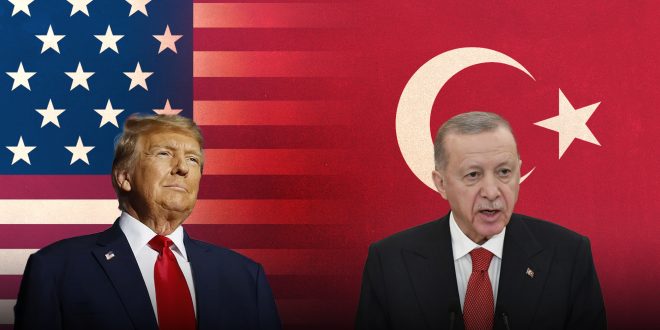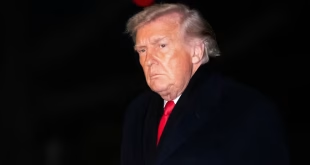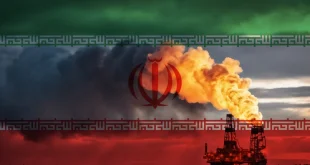The U.S.-Turkey relationship faces considerable challenges and opportunities during Trump’s second term, emphasizing defense cooperation, economic ties, and regional security. Observers in Ankara are cautiously optimistic that Trump’s transactional diplomacy could help resolve contentious issues, leveraging common interests in this crucial bilateral relationship despite the complex geopolitical environment.[1]
The personal bond between President Trump and Turkish President Recep Tayyip Erdoğan may prove vital for advancing collaboration and diplomacy. Former U.S. Ambassador James Jeffrey highlights both leaders’ pragmatism and prioritization of national interests over personal conflicts. This pragmatism could enable cooperation on shared regional goals while navigating the intricate aspects of U.S.-Turkey relations. Trump’s transactional approach and Erdoğan’s strategic thinking complement each other, potentially facilitating discussions on pressing issues.[2]
Syria and the YPG
The U.S.’ cooperation with the Kurdish-led YPG (People’s Protection Units) in Syria remains one of the most controversial facets of U.S.-Turkey relations. While the YPG has been a crucial U.S. ally in the fight against ISIS, enabling the U.S. to maintain a presence in the area with minimal direct military engagement, Türkiye views the group as an extension of the Kurdistan Workers’ Party (PKK), designated as a terrorist organization by Washington. Ankara perceives the YPG’s increasing power near its borders as a direct threat to its sovereignty, territorial integrity, and national security. Since this partnership undermines Türkiye’s strategic goal of containing Kurdish militancy within its borders, the U.S.-YPG alliance presents a significant political challenge for Türkiye.[3]
Türkiye is concerned that the YPG’s gains in Syria could encourage Kurdish separatist movements within its borders, escalating unrest and violence.[4] In response, Ankara has launched several military operations in northern Syria to establish a buffer zone and push YPG militants away from its borders. These actions underscore Türkiye’s determination to address what it perceives as a serious security threat.[5]
Türkiye has also sought to reduce YPG dominance through diplomatic means, including talks with Russia, Iran, and the Syrian government.[6] However, conflicting regional goals and deep-rooted mistrust continue to impede these efforts. The ongoing conflict underscores the need for a more balanced strategy that addresses Türkiye’s security concerns while preserving Syria’s stability and territorial integrity.[7]
Citing the need to protect its borders and counter what it perceives as a direct security threat, Türkiye has signaled its readiness to launch further military operations against the YPG in northern Syria. Meanwhile, the U.S. must balance its collaboration with the YPG—a crucial ally in the fight against ISIS—with its geopolitical engagement with Türkiye, a key NATO member. Escalating hostilities between the YPG and Türkiye risk further straining U.S.-Türkiye relations and complicating efforts to stabilize Syria. Multi-party talks involving the U.S., Türkiye, the Syrian government, and possibly Russia may be necessary to address these issues. Such discussions could explore measures to reduce tensions, including territorial and security assurances. However, achieving a lasting resolution will likely require significant concessions from all parties.[8]
U.S. Foreign Policy Toward Syria and Türkiye
A second Trump administration could significantly reshape U.S. policy toward Syria, the Kurds, and Türkiye, particularly if Marco Rubio is appointed Secretary of State. Rubio has strongly advocated for U.S. support to Kurdish forces in Syria, emphasizing their critical role in the fight against ISIS.[9] He has consistently opposed Trump’s earlier calls to withdraw American forces from Kurdish-controlled regions. Under Rubio’s leadership, U.S. support for Kurdish forces is likely to persist, as evidenced by his sharp criticism of Türkiye’s actions against Kurdish groups and his connections with figures like Enes Kanter, a member of the outlawed FETÖ (Gülenists) and a vocal critic of Turkish President Recep Tayyip Erdoğan.[10]
Rubio’s foreign policy approach could result in a more aggressive posture in the Middle East, including support for Kurdish-controlled oil-rich areas and increased pressure on the Assad regime in Syria. Additionally, his focus on strengthening ties with Israel and the YPG might lead to a more assertive policy toward Iran.[11] These strategies could deepen U.S. involvement in the region, further straining relations with Türkiye, even as they conflict with Trump’s occasional isolationist rhetoric.[12]
National Security Advisor Michael Waltz on U.S.-Türkiye Relations
Michael Waltz, a former Green Beret and outspoken advocate for Kurdish militants, is another figure whose potential nomination as National Security Advisor could significantly impact U.S.-Türkiye relations. Waltz’s long-standing support for Kurdish autonomy and deeper U.S.-Kurdish cooperation has raised significant concerns in Türkiye, which views these policies as threats to its national security. Ankara has consistently denounced U.S. assistance to the YPG, which it regards as an extension of the terrorist-designated PKK.[13]
As National Security Advisor, Waltz would have to balance the competing priorities of supporting Kurdish forces in the fight against ISIS and addressing the security concerns of NATO ally Türkiye. Bilateral relations are already strained due to Türkiye’s military operations against YPG-controlled areas in Syria and Iraq. Waltz might pursue two potential approaches: employing diplomatic measures to alleviate Türkiye’s concerns while maintaining U.S. support for Kurdish forces. Striking this balance would require careful navigation of Türkiye’s security priorities alongside broader U.S. strategic objectives, particularly if Turkish military actions against the YPG escalate.[14]
Tulsi Gabbard’s Stance on Türkiye
The prospective Director of the U.S. National Intelligence, Tulsi Gabbard, has taken a strong stance against Erdoğan and Türkiye. She has accused Erdoğan of supporting ISIS and committing “ethnic cleansing” against Kurds during Türkiye’s military operations in northern Syria.[15] Given her outspoken criticism of Erdoğan’s leadership and Türkiye’s regional actions, her nomination could further strain U.S.-Türkiye relations.[16]
Russia S-400 Air Defense System: Straining U.S.-Türkiye Relations
Türkiye’s purchase of the Russian S-400 air defense system remains one of the most contentious issues in U.S.-Türkiye relations. Finalized in 2017 despite strong opposition from the U.S. and NATO allies, the deal raised concerns that sensitive aspects of the U.S. F-35 stealth fighter program could be compromised. In response, the Trump administration removed Türkiye from the F-35 program in 2019 and imposed sanctions under the Countering America’s Adversaries Through Sanctions Act (CAATSA).[17]
Despite these measures, President Trump at times downplayed the issue, attributing some responsibility to the Obama administration’s handling of Türkiye’s request for Patriot missiles. However, tensions escalated when Türkiye tested the S-400 system in 2020, prompting the U.S. to impose additional sanctions on Türkiye’s defense sector. Beyond disrupting military collaboration, the dispute has fueled broader concerns about Türkiye’s geopolitical orientation and its future within NATO.[18]
F-35 Program and Alternative Solutions
After Turkey purchased the Russian S-400 missile defense system, it was expelled from the F-35 program in 2019. The U.S. insisted that the F-35 and S-400 systems could not cohabit because of security concerns, even after Ankara had spent US$1.4 billion on the aircraft’s co-production and maintenance.[19] Despite optimism about rejoining the program under a second Trump administration, negotiations have been made more difficult by the rejection of proposals to place the S-400s under U.S. supervision.[20]
As an alternative, Türkiye has expressed interest in purchasing F-16 Block 70 fighter fighters, which the U.S. just approved in a US$23 billion deal.[21] However, this agreement is now under further scrutiny due to legislative worries over Türkiye’s regional actions and NATO ties, especially its disputes with Greece.[22] For the F-35 problem and other military cooperation to advance, confidence must be restored and larger geopolitical issues must be settled.[23]
Impact of the Ukraine Conflict
U.S.-Türkiye ties have been significantly impacted by the ongoing conflict in Ukraine and the changing political circumstances following the 2024 U.S. presidential election.[24] The U.S. demonstrated its commitment to Ukraine by approving a $61 billion aid package as Ukrainian soldiers face artillery shortages and an intensifying battle. Erdoğan was one of the first to congratulate Trump on his reelection, expressing hope for renewed cooperation in Ukraine and Gaza.[25]
With ties to both Russia and Ukraine, Türkiye’s unique role as a mediator in the Ukraine war may enhance U.S.-Türkiye collaboration. Experts suggest that improved relations could lead to joint initiatives in Syria, where Türkiye opposes U.S. support for the YPG.[26] By leveraging its strategic location and diplomatic connections, Türkiye could position itself as a key partner in fostering regional stability and facilitating peace negotiations between Kyiv and Moscow.[27]
Expectations for Economic Cooperation
Tariff disputes have long defined the strained trade relations between the U.S. and Türkiye. Türkiye retaliated with taxes on $791 million worth of U.S. exports after the U.S. imposed 25% tariffs on Turkish steel under Section 232 of the Trade Expansion Act. Economic relations have also been strained by high agricultural tariffs, administrative roadblocks, and intellectual property conflicts. Trade tensions intensified in 2019 when the Trump administration removed Türkiye from the Generalized System of Preferences (GSP).[28]
Türkiye hopes that Trump’s reelection will lead to lower tariffs, particularly on steel and textiles, as bilateral trade is projected to reach $28.5 billion in 2023.[29] Ömer Bolat, the Turkish Minister of Commerce, has expressed optimism that reduced tariffs will boost trade and strengthen Türkiye’s competitive sectors. Investor confidence in potential U.S. policy changes supporting economic growth in Türkiye is reflected in positive market trends, such as a stronger Turkish lira and a 3% rise in Istanbul’s stock market index.[30]
In 2018, Presidents Trump and Erdoğan set an ambitious goal of $100 billion in bilateral trade, nearly three times the $31.3 billion recorded at the time. Recent figures show U.S. exports to Türkiye at $15.9 billion and Turkish exports to the U.S. at $15.4 billion, indicating steady growth but still falling far short of the target. Both countries remain committed to expanding their economic partnership, viewing this objective as a cornerstone for strengthening bilateral relations.[31]
Conclusion
Donald Trump’s return to the presidency brings both continuity and the potential for change in the historically complex U.S.-Türkiye relationship, characterized by periods of both cooperation and tension. Trump’s personal relationship with Turkish President Recep Tayyip Erdoğan, grounded in a shared preference for direct talks, provides a foundation for addressing unresolved issues. Key challenges include tensions over U.S. support for the Kurdish-led Syrian Democratic Forces (SDF)/YPG, stemming from Türkiye’s security concerns regarding PKK separatism, and Türkiye’s purchase of the Russian S-400 missile defense system, which led to U.S. sanctions and Türkiye’s removal from the F-35 fighter jet program.
Erdoğan remains optimistic that Trump’s transactional diplomacy could strengthen ties, particularly in trade and military cooperation. The ambitious $100 billion trade goal and discussions to resolve the S-400 and F-35 disputes remain central topics. By aligning policy more closely with Ankara’s security priorities, Trump may reconsider U.S. military involvement in Syria, potentially easing tensions over Kurdish-related issues. However, Türkiye’s commitment to a multi-vector foreign policy, emphasizing ties with non-Western blocs such as BRICS and the Organization of Turkic States (OTS), continues to challenge its alignment with NATO and the U.S.[32]
Collaboration remains possible, particularly through Türkiye’s role as a mediator in the Russia-Ukraine conflict. With Erdoğan maintaining relationships with both Kyiv and Moscow, Türkiye is well-positioned to act as a reliable intermediary in Trump’s potential ceasefire mediation efforts. This aligns with U.S. objectives to counter Russian aggression and leverage Türkiye’s regional influence to promote stability. However, for such collaboration to succeed, both parties must remain flexible and share common strategic goals.
Additional complexities stem from regional factors, such as Türkiye’s support for Hamas and its criticism of Israel during the Gaza conflict. Relations may also be strained by differing perspectives on Iran’s nuclear program, particularly if Trump reinstates the strict “maximum pressure” policies from his previous term. Washington’s more assertive approach contrasts with Ankara’s preference for diplomatic solutions, highlighting broader divergences in handling regional security challenges.
Trump’s hawkish cabinet choices, including Michael Waltz as National Security Advisor and Marco Rubio as Secretary of State, signal a stronger U.S. foreign policy stance. Both have expressed disapproval of Türkiye’s geopolitical maneuvers and military actions against Kurdish-led YPG forces. Despite these challenges, Türkiye’s strategic role in international security and its significance as a NATO member may provide opportunities for cautious collaboration. The next phase of U.S.-Türkiye relations will largely depend on addressing key issues such as defense ties, trade goals, and geopolitical realignments.





